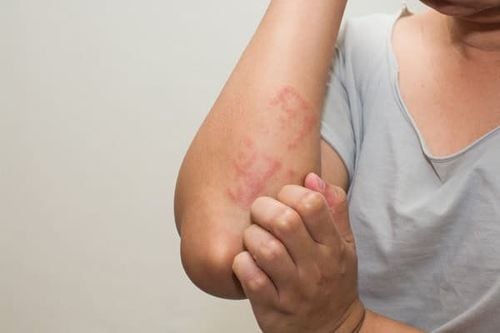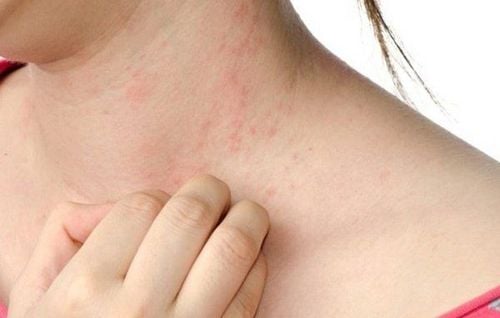This is an automatically translated article.
The article was professionally consulted with Master, Doctor Dang Huy Toan - Department of Pediatrics - Neonatology - Vinmec Nha Trang International General Hospital.Allergies occur when your immune system reacts to a foreign substance such as pollen, bee venom, pet dander, or food. During an allergy, the immune system creates antibodies to destroy the allergen, even though the allergens may not cause harm to the body.
Immune system reactions that inflame the skin, sinuses, airways or digestive system and the severity of allergies varies from person to person, from minor irritation to anaphylaxis.
1. Causes of allergies
Allergies begin when your immune system mistakes a normally harmless substance for a dangerous infection. The immune system then creates antibodies against those allergens and stays in the blood. When you are exposed to the allergen again, these antibodies release certain immune system chemicals, such as histamine, that cause allergy symptoms. Common allergens include:Airborne allergens, such as pollen, animal dander, dust mites and molds Certain foods, especially peanuts, tree nuts, allergens wheat, soy, fish, shellfish, eggs and milk Insect stings, such as bees or wasps Medicines, especially penicillin or similar antibiotics Latex or other substances that you touch, which can cause skin allergies
2. Mechanisms and allergic reactions occur in how many stages?
Because each agent will have different mechanisms to cause allergic reactions on each body part, the following article will talk about the mechanism of the most dangerous allergic reaction that affects the patient's life. anaphylaxis .Anaphylaxis is a severe allergic reaction that involves more than one body system (e.g., skin and respiratory and/or gastrointestinal tract) that begins very quickly and may cause death. Anaphylaxis occurs with 3 stages as follows:
The first stage is the sensitization phase: starting from when the allergen enters the body by injection, transmission, inhalation, ingestion, or by skin contact. . The latent period is 7 to 10 days, during which antibodies, most commonly IgE, are produced and bind to basophils and mast cells. The second stage is the stage of pathogenesis: At the second exposure to the allergen, the allergen will combine the IgE molecule with the participation of eosinophils, which releases a variety of mediators: histamine, serotonin, bradykinin, prostaglandin D2, leucotrienes (D4, B4)... The third stage is the pathophysiological stage. During this stage, the above active ingredients dilate large arteries causing hypotension, bronchospasm causing difficulty breathing, stomach and duodenum spasms causing abdominal pain, cerebral artery spasms causing headaches, dizziness. , coma.
3. Signs of an allergy

Hắt hơi, ngứa mũi là dấu hiệu của viêm mũi dị ứng
Allergic rhinitis has symptoms such as:
Sneezing Itchy nose, itchy eyes or palate Runny, stuffy nose Watery, red, or swollen eyes (conjunctivitis) Food allergies with symptoms like:
Itching in the mouth Swelling of the lips, tongue, face or throat Hives Anaphylaxis An allergy to an insect sting has symptoms such as:
Swelling/Huge swelling at the site of the sting or sting Itching or hives all over the body Coughing , chest tightness, wheezing or difficulty breathing Anaphylactic shock Drug allergy symptoms such as:
Urticaria Itching skin Rash Face swelling Wheezing Anaphylaxis Atopic dermatitis, an allergic skin condition also known called eczema with symptoms such as:
Itching Blisters Crusting or desquamation Anaphylaxis
4. When to see a doctor?
You can see your doctor if symptoms you think are caused by an allergy and the over-the-counter allergy medications you take don't relieve your symptoms. If you have any of these symptoms soon after starting a new medication, call the doctor who prescribed it.For a severe allergic reaction such as anaphylaxis, call 911 or refer the person to the nearest Medical facility. If an epinephrine auto-injector pen is available in the household (Auvi-Q, EpiPen, or other), use it immediately on the sick person. Even if a person's symptoms improve after injecting epinephrine, family members should take the patient to the emergency department to make sure symptoms don't return once the injection wears off.
5. Who is prone to allergies?

Những người có tiền sử gia đình mắc bệnh hen suyễn dễ bị dị ứng hơn bình thường
Have a family history of asthma or allergies, have symptoms such as allergic rhinitis, hives or eczema Are a child You have asthma or Other allergic diseases At Vinmec International General Hospital, there is a package of examination and advice on treatment of atopic dermatitis to help customers assess the overall condition of the disease and advise on measures to help prevent recurrence. broadcast.
When registering for a package of examination and consultation for treatment of atopic dermatitis, customers will receive: Dermatology specialist examination. Perform tests such as: quantitative IgE, fresh mycobacteria, specific IgE quantification with respiratory allergens - food (Panel 1 Viet), test Rida Allergy Screen (panel 1)...
Please dial HOTLINE for more information or register for an appointment HERE. Download MyVinmec app to make appointments faster and to manage your bookings easily.
References: Mayoclinic.org; Nhs.uk












